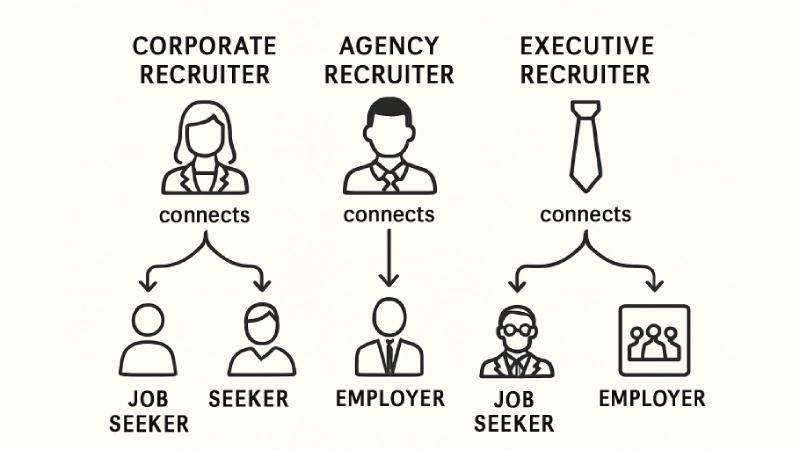Highlights
- Recruiter Roles are varied and pivotal within today’s hiring ecosystem, shaping outcomes for both candidates and employers.
- Understanding recruiter responsibilities can help job seekers and hiring managers navigate the hiring process more effectively.
- The landscape for talent acquisition is continually evolving due to technology, economic trends, and changing workplace expectations.
- External resources and research further illuminate how diverse recruiter functions shape the modern workforce.
Who Are Recruiters and What Do They Do?
In today’s dynamic hiring ecosystem, a recruiter is a vital link between candidates and organizations. These talent professionals do far more than simply screen resumes—they evaluate fit, understand organizational culture, and shape the talent pipelines of the future. Their expertise helps individuals and companies successfully navigate the complexities of modern hiring, transforming a daunting process into a more manageable and often rewarding experience. A recruiter’s job extends from the first outreach to guiding candidates through interviews and negotiations. They don’t just fill positions; they cultivate relationships built on trust and insight. For many, recruiters serve as navigators—connecting ambitious professionals with meaningful work while helping employers find talent that aligns with their goals and values.
Types of Recruiters in the Job Market
- Corporate Recruiters: These recruiters are embedded within a specific company and bring a deep understanding of its operations, culture, and strategic goals. Corporate recruiters create highly tailored hiring solutions by focusing solely on one organization.
- Agency Recruiters: Operating externally, agency recruiters work with multiple clients across industries, leveraging a broader scope of job seekers and employer needs. Their agility allows them to meet varying hiring demands quickly.
- Executive Recruiters: Sometimes called headhunters, executive recruiters specialize in sourcing senior leaders and specialized professionals, using networks and discretion to place candidates in high-impact roles.
- Contract Recruiters: Companies turn to contract recruiters for flexible, project-specific hiring. Whether ramping up for expansion, a product launch, or a hiring drive, these recruiters offer critical expertise on demand.
Each recruiter type offers distinct advantages, strengthening the overall efficiency and expertise of the hiring ecosystem. A corporate recruiter, for example, builds institutional memory and tailored approaches, while an agency recruiter rapidly adapts to different client needs, offering a broader perspective and resourcefulness.

How Recruiters Help Employers and Job Seekers
Recruiters play a dual role as advocates and advisors. Employers alleviate the pressures of talent sourcing, attract specialized candidates, conduct skill-based screening, and present only the best fits. This efficiency can drastically reduce time-to-hire and operational downtime. For job seekers, recruiters act as career mentors, refining resumes, providing interview coaching, and offering insights into the unique qualities employers value. Industry research reinforces that recruiter-guided processes often lead to stronger matches and better long-term outcomes, benefiting both sides of the employment equation.
Technology and Tools Changing Recruitment
Technology is transforming the recruiting world, ushering in new levels of speed, accuracy, and scalability. Modern recruiters depend on applicant tracking systems (ATS), AI-driven resume screening, data analytics, and automated scheduling systems. With video interviews and online skill assessments now routine, recruiters can reach more candidates efficiently, regardless of geography—a vital shift given the global rise of remote work. AI’s influence is rapidly accelerating. AI technologies are helping recruiters sift through thousands of applications, spot patterns, and reduce unconscious bias—reshaping hiring for the better while allowing professionals to focus on relationship-building and nuanced decision-making.
Trends in Talent Acquisition: What the Data Shows
The emergence of remote work has revolutionized both talent acquisition and candidate expectations. Flexible and hybrid work arrangements are increasingly the norm, compelling recruiters to broaden their approach and seek candidates from increasingly diverse locations. Specific remote roles attract more than half of all job applications in their sectors, demonstrating a dramatic shift in job-seeker priorities and recruiter strategies.
Challenges Recruiters Face Today
Navigating today’s job market comes with significant challenges for recruiters. Talent shortages in specialized industries, shifting candidate desires for flexibility and purpose, and ever-changing compliance requirements all add complexity to their work. The phenomenon of “ghosting,” where candidates abruptly disengage mid-process, creates additional uncertainty. Adaptability, continuous upskilling, and keen legal awareness are now non-negotiable traits for recruiters who want to succeed.

How to Work with a Recruiter: Tips for Success
- Be Transparent: Openly share your career ambitions, preferred work styles, and any constraints to help your recruiter find your best match.
- Stay Responsive: Speed and clear communication keep your application process on track and demonstrate professionalism.
- Seek Feedback: Request actionable insights following interviews or assessments; this fosters learning and improved future outcomes.
- Build Rapport: Engage with recruiters as partners rather than gatekeepers; strong relationships can lead to more—and better—opportunities over time.
The Future of Recruitment: Skills That Matter Most
Success in recruitment now hinges on combining technical savvy and human-centered skills. Adaptability allows talent professionals to thrive amid rapid change, while technological fluency is required to manage data-driven hiring processes and AI tools. Crucially, empathy and emotional intelligence enable recruiters to read between the lines, advocate for candidate well-being, and foster diversity and inclusion at every stage of the hiring process. As hybrid work models and digital-first strategies become standard, recruiters who can integrate these skills will continue to drive positive transformation in the hiring landscape.
Conclusion
Recruiters are not just connectors—they’re strategic partners, educators, and advocates navigating a fast-evolving talent market. Their evolving role is key to organizational growth and individual career success. Whether you’re a job seeker or an employer, understanding what sets recruiters apart can unlock smoother, more effective hiring experiences and outcomes in today’s job market.
